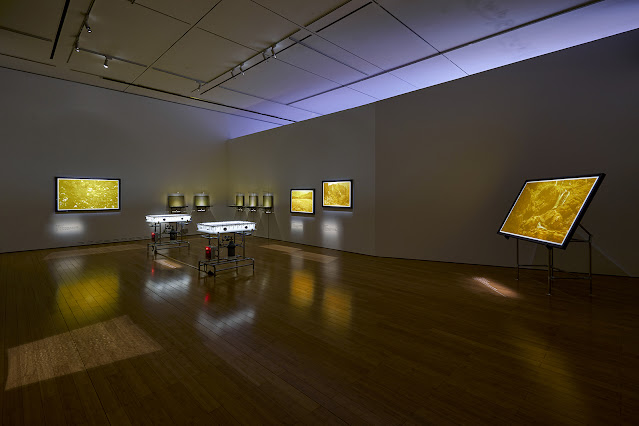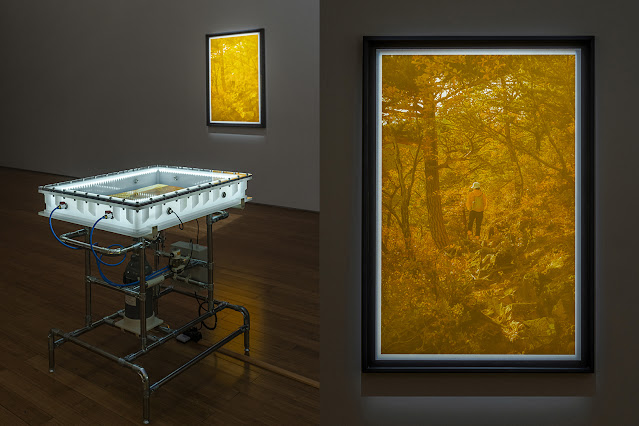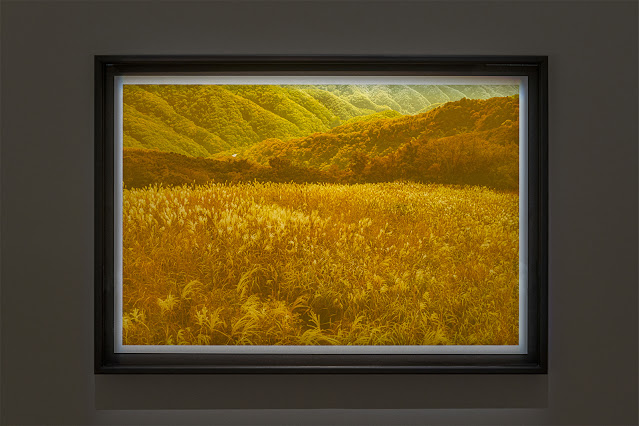Installation view of Is of at Daegu Art Museum, 2024
Is of: Mt. Palgong # 1
Inkjet printed with natural pigment, Acrylic, Nitrogen, Gas tank, Gas regulator, LED, Stainless Steel, Mixed media 110 x 85 x 86cm, 2024
Detail from Is of: Mt. Palgong # 1
Inkjet printed with natural pigment, Acrylic, Nitrogen, Gas tank, Gas regulator, LED, Stainless Steel, Mixed media 110 x 85 x 86cm, 2024
Detail from Is of: Mt. Palgong # 2
Inkjet printed with natural pigment, Acrylic, Nitrogen, Gas tank, Gas regulator, LED, Stainless Steel, Mixed media 110 x 85 x 86cm, 2024
Right - Is of: Mt. Seorak # 02
Inkjet printed with natural pigment, epoxy resin coating, wood, mixed media
116 x 81 cm, 2023
Is of: Mt. Naejang Series
Inkjet printed with natural pigment, epoxy resin coating, wood, mixed media
42 x 29cm, 2018
Is of: Mt. Gwanak
, Inkjet printed with natural pigment, epoxy resin coating, wood, mixed media
98 x 152 cm, 2021
Is of: Mt. NaeJang
Inkjet printed with natural pigment, epoxy resin coating, wood, mixed media
74 x 106 cm, 2021
Is of: Mt. Seorak # 1
Inkjet printed with natural pigment, epoxy resin coating, wood, mixed media
74 x 106 cm, 2021
Is of: Mugunri Moss Waterfall
Inkjet printed with natural pigment, epoxy resin coating, wood, mixed media
166 x 114 cm, 2023
2011년부터 시작된 <Is of> 프로젝트의 결과물은 자연풍경사진이다. 하지만 일반적인 사진과 다르게 프린팅에 이용되는 잉크가 사진 속 대상인 자연물에서 비롯된다는 점에서 크게 다르다. 예를 들어, 가을에 찍은 단풍풍경사진을 프린트한다고 치면, 울긋불긋한 단풍잎에서 각각의 색소를 추출하고 그 색소를 프린터의 잉크로 이용해서 사진을 출력하는 것이다. 이렇게 출력된 사진은 일반적인 자연풍경사진과 사뭇 다르다. 첫번째 다른 점은 우리가 은연중에 생각했던 것과 달리 실제 자연의 색은 그다지 화려하지 않다는 것이고, 두번째는 어쩌다 강렬한 색으로 출력되더라도, 1~2주 정도면 (마치 화려했던 단풍잎이 옅은 갈색의 낙엽이 되듯이) 색이 바래지고 사진은 결국 사라진다는 것이다. 즉, 사진이 그 사진 속 지시대상인 자연과 여전히 연결되어 있음을 의미하는데, 이는 본래 사진이 가지고 있는 특징과 매우 상반된다. 일반적인 사진은, 그 사진이 찍힌 순간부터 사진 속 지시대상으로부터 완전히 분리되어 불멸을 누리는데 한편, 사진 속 실제 대상은 곧장 변화라는 흐르는 물살에 몸을 맡기기 때문이다. 하지만 Is of는 사진(자연풍경)과 사진 속 지시대상(자연물)을 질료적으로 결합시킴으로써, 사진의 극단적인 분리성을 중화시킨다. 즉 Is of 사진은 단지 ‘존재했었음’만을 인증하는 기록의 매체가 아니라, 사진 속 대상이 현재 우리와 함께 있으며 실제 자연과 같이 변화와 소멸의 과정에 놓여있음을 얘기하는 것이다. 하지만 아이러니하게도 나는 이 작업은 진행하면서 동시에 사진을 영구적으로 보존하는 노력을 함께 기울여왔다. 사진의 색을 변질시키는 가장 직접적인 원인이 되는 산소를 차단하는 다양한 방식 (사진을 투명 레진에 담그는 함침법, 산소를 질소로 치환해주는 진공 챔버)을 개발하고, 낮은 조도의 조명을 이용해 사진을 자외선으로부터 보호하는 것이다. 기껏 기존의 사진과는 다른, 우리와 함께 변화하고 소멸하는 사진을 만들어놓고, 또 그것을 의도적으로 통제하기 위한 연구를 따로 진행해왔다는 것이 좀 의아하게 느껴질 수 있다. 나는 이러한 이유에 대해 단지 ‘나는 인간이기 때문에’라는 대답밖에 떠오르지 않는다. 변화라는 단순한 진리를 받아들이지 못하고, 무슨 수를 써서라도 눈앞에 펼쳐진 아름다운 자연을 박제시키려 했던 나의 노력은 개인적인 욕망을 넘어서 가장 보편적인 인간의 모습이 아닐까 생각했기 때문이다.
The outcome of the <Is of> project, which began in 2011, is nature landscape photographs. However, unlike conventional photographs, there is a significant difference in the ink used for printing, as it is derived from the natural elements depicted within the photograph itself. For example, when printing a landscape photo of autumn foliage, pigments are extracted from the colorful leaves and utilized as ink to produce the image. These printed photographs are quite different from typical nature landscape photos. Firstly, contrary to what we might subconsciously assume, the colors of real nature aren't always as vibrant. Secondly, even if printed with vivid colors, they tend to fade within 1 to 2 weeks, similar to how vibrant autumn leaves eventually turn into pale brown remnants, causing the photo to eventually disappear. This implies that the photograph remains connected to the natural subject it captures, which is contrary to the inherent characteristic of conventional photographs. Typically, a photo separates completely from its subject at the moment it's taken, enjoying immortality, while the actual subject undergoes constant change. However, through the <Is of> project, by blending the photograph (nature landscape) and the subject within it (natural elements), the extreme separateness of the photograph is neutralized. In essence, Is of photographs serve not only as records certifying their existence but also as indicators that the subjects within the photos exist alongside us, undergoing the processes of change and disappearance just like real nature. However, ironically, I've also made efforts to preserve the photos permanently while working on this project. I've developed various methods to block oxygen, the primary cause of color distortion in photos, such as immersing them in transparent resin or substituting oxygen with nitrogen in a vacuum chamber. Additionally, I've utilized low-light conditions to protect the photos from ultraviolet rays. It might seem puzzling to create photos that change and eventually fade, only to conduct separate research to intentionally control them. Yet, when asked about these reasons, I can't think of any response other than "because I'm human." Perhaps my efforts to preserve the beauty of nature, even at the expense of accepting the simple truth of change, reflect a universal aspect of human nature—an attempt to immortalize the fleeting beauty before our eyes by any means possible, extending beyond personal desires.










